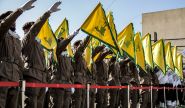
When irrationality and reckless behavior come to define the actions of a powerful political faction, it doesn’t take long before red lines are dangerously breached. As a result, serious threats hang over the lives of populations directly exposed to the faction’s erratic excesses. This is exactly what we are witnessing today among several of the figures fueling turmoil across the Levant.
Last Wednesday’s Knesset decision, clearly driven by Israel’s far-right, should be seen in this context: the consideration of two bills aimed at outright annexation of the West Bank. It takes little strategic insight to see this move as a deliberate attempt to undermine President Donald Trump’s commendable efforts. These efforts aim to quickly expand the Abraham Accords to new key countries, notably Saudi Arabia, and to set the Middle East decisively on the path toward comprehensive and lasting peace. Trump responded swiftly, putting matters in perspective and underscoring – an unprecedented stance in U.S.-Israel relations – that Israel would “lose U.S. support” if it went ahead with its plans to annex the West Bank…
It is hard not to feel dismayed by the stubbornness of Israel’s far right in blocking the creation of a Palestinian state, a sine qua non for establishing comprehensive peace in the region. This same stubbornness was behind the derailment of the Oslo process in 1993–1994 and the assassination of Labor Prime Minister Yitzhak Rabin in November 1995. Two pressing questions arise sharply in this context: how long will the far-right hardliners continue to block every peace initiative without ever proposing a rational Plan B, and how long will Israeli society, held back by their deadlocks, be dragged into costly new wars every few years?
A similar irrationality is evident in the behavior of the other Levantine standard-bearer of blind obscurantism: Hezbollah. The pro-Iranian faction continues to refuse to hand its weapons over to the state, claiming that its military arsenal is necessary for “the defense of Lebanon” against Israel. Such an argument – a blatant insult to the intelligence of the Lebanese – ignores the fact that this militia arsenal failed to prevent the rapid elimination of the group’s political and military leadership in 2024. Likewise, the arsenal is also entirely ineffective against the ongoing Israeli presence in the south and the near-daily air raids on Hezbollah’s fortifications. That is before mentioning the systematic assassinations of the group’s cadres and officials across the country, with more than 360 killed since hostilities ended in November 2024.
The height of absurdity is reached, however, in the campaign waged by the Hezbollah-Amal duo against the government. The Salam cabinet is accused of laxity in rebuilding villages destroyed during the “support war” launched two years ago by the Pasdaran ally, clearly at the instigation of the Iranian regime. Yet, while pressing the government on this reconstruction, Hezbollah is meanwhile stepping up its efforts to restore its military infrastructure and reorganize the ranks and hierarchy of its militia apparatus.
This reveals a striking paradox. After reopening the southern front on October 8, 2023, under the false pretense of supporting Hamas, the Shia group is now demanding that the state rebuild villages that will almost certainly be destroyed again in the next war. That war is already being prepared, and that will probably be launched in a few years at the request of the wali al-faqih to serve the interests of the Islamic Republic.
And so the cycle continues, leaving Lebanon trapped indefinitely in the vicious spiral imposed manu militari by Tehran. Sooner or later, willingly or not, Hezbollah’s leadership and its regional patron will have to face reality and acknowledge that the vast majority of Lebanese, including many within the Shia community, are no longer willing to pay the price for wars waged by others. With the support of friendly powers, they are determined to achieve lasting peace, prosperity, and long-overdue socio-economic well-being…




Comments